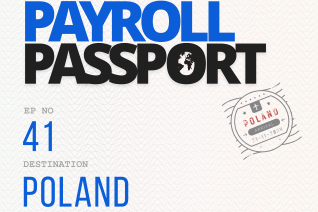Establish your presence globally with Neeyamo as we help you go beyond borders to manage your global payroll and hire new talent in Poland.
Overview
Poland is a country located in the continent of Europe, sharing its border with Germany, Russia, Lithuania, Ukraine, Slovakia, the Czech Republic, and Belarus. The prominent industries in the country include the food and beverage sector, chemicals and pharmaceuticals, automotive industry, non-metallic mineral sector, iron and steel sector, and the Information and communications technology sector.
Neeyamo provides Employer of record and Global Payroll Services. It assists with the onboarding and management of employees in Poland, along with the processing of a firm's payroll, compliance, benefits, and more.
Our Presence
Tools And Instances
Facts And Stats
Capital
Warsaw
Currency
Polish Zloty (PLN)
Official Language
Polish
Fiscal Year
1 January - 31 December
Date Format
DD/MM/YYYY
Country Calling Code
48
Other Languages
English
Time Zone
Central European Time Zone (UTC +01:00)
Global Payroll
Overview
Handling payroll for a widespread workforce can pose a significant challenge for any organization, and the added complication of compliance can make things worse. If companies spend more time processing payroll, it directly impacts day-to-day operations and their overall productivity.
Over the years, Neeyamo - a payroll specialist, has observed these complexities and strived to provide a global payroll solution through a single technology platform - Neeyamo Payroll.
Payroll Taxes
Payroll tax is the percentage amount retained from an employee's salary and paid to the government to invest in the general population's welfare. These are statutory in nature and are levied from both the employer and employee. Additional statutory contributions are made by employers towards aiding both short-term and long-term benefits for their employees.
Employee Taxes
In Poland, the following contributions for employee taxes are made:
- 9.76% - Retirement
- 1.50% - Pension
- 2.45% - Sickness
- 9.00% - Health Insurance
22.71% - Total Employee Cost
Employee Income Tax
The tax rates applicable for income derived in 2024 are:
| Tax Bracket | Percentage |
| Up to PLN 120,000 | 12% |
| Above PLN 120,000 | PLN 10,800 + 32% |
Employer Taxes
For Employer Taxes, the following contributions are made:
| Retirement Pension | 9.76% |
| Pension | 6.50% |
| Disability | 0.67% - 3.33% |
| Labor Fund | 2.45% |
| Guaranteed Employee Benefit Fund | 0.10% |
| Total Employee Cost | 19.48% - 22.14% |
Payroll Cycle
Overview
Undoubtedly, payroll is a critical process for any organization. Pay cycle in Poland refers to the period for which an organization pays its employees, and this can vary depending on the pay frequency that the organization chooses to adopt.
Frequency
Salaries are paid on a monthly basis, with employees receiving their pay no later than the 10th of the following month.
13th Month Cycle
There is no legal requirement for 13th & 14th month payments.
Global Work
Overview
An Employer of Record (EOR) service provider helps you eliminate the hassle of handling complexities while onboarding a new employee in an international location. They help bridge the gap that otherwise mandates organizations to have a local registered entity and a local bank account, prior to making a job offer to an international hire.
An Employer of Record (EOR) service provider acts as a legal employer, facilitates salary payments, and manages other statutory requirements such as health insurance, payroll taxes, and employee benefits, and ensures compliance with local tax laws and regulations.
This allows organizations to focus on collaborating with the employees in Poland for operational tasks, with the knowledge that they have a cost-effective solution supporting their global payroll & HR requirements, as they continue their global expansion.
HR Mandates and Practices
Minimum Wage
Effective January 1, 2026:
- Minimum Monthly Wage: Will increase to PLN 4,806 gross.
- Minimum Hourly Rate: Will rise to PLN 31.40 gross.
Overtime
Overtime is defined as hours worked in excess of 8 per day and 40 per week. Working hours, including overtime, must not exceed 48 hours per week. Overtime cannot exceed 150 hours per year.
Overtime will be rewarded in the following ways:
- Get a bonus of 200% for overtime work done - at night. on days other than the employee's working days, such as Sundays and holidays. Granted to an employee on a non-working day in exchange for work done on a Saturday or a holiday
- 150 % – for extra work completed on days other than those listed in subsection 1. Employers may provide time off to employees instead of paying for overtime.
Overtime cannot exceed 150 hours in a calendar year. However, a collective bargaining agreement, employer work regulations or the employment contract may stipulate differently, but no more than 48 hours a week on average, as is the current EU legislation. Employees are entitled to a 50-percent premium for overtime hours worked during a business day, or a 100-percent compensation for overtime worked at night, on Sundays, or on public holidays that are not average working days.
Data Retention Policy
Employers may store payroll records in paper or electronic form and employees can request copies of such records. For employees whose employment began in 2019 or later, the minimum retention period for payroll records is 10 years. For employees employed from 1999-2018, the minimum retention period for payroll records is 50 years, but the period can be reduced to 10 years if the employer submits an information report to the Social Security Office. The minimum retention period for payroll records of employees employed before 1999 is 50 years.
Employers must maintain records of the circumstances and the causes of an accident at work and all other documentation related to the accident for 10 years.
Tax documentation must be kept 5 years from end of the calendar year in which tax payment was due.
Employers that fail to keep proper records can be subject to a fine of up to 5,000 zloty.
Changes in labor code:
With effect from February 1, 2023, the employees will be able to take Force majeure leave in urgent family matters, caused by illness or accident, if the employee's immediate presence is required.
Under the new regulations, the maximum trial period will depend on the type and length of the employment contract that the employer wishes to conclude with the employee after the end of the trial period.
The upper age restriction for a child to qualify for leave (paternity leave, leave on maternity leave conditions, and parental leave) for adoptive parents has been extended.
Changes in the provisions that clarify the leave entitlements of foster parents who have adopted a child being brought up in a foster family.
Amendments to the labor code
With effect from April 7, 2023, Employers will need to introduce or adopt internal regulations on remote work. Remote work rules have to be discussed with the trade union organizations.
If there are no trade union organizations at the employer's premises, it will be consulted with the employee representatives selected per the procedure adopted by the employer.
Employers who introduce sobriety checks at the workplace will need to adapt privacy notices for employees to reflect the new purpose of data collection.
Employment updates for 2023
Effective Date: January 1, 2023( Social Security contribution update for 2023, holiday pay, business trip allowance)
January 17, 2023 (Increase in compensation for the use of a private car for business purposes)
- The annual limitation value of the contribution calculation basis for pension and disability insurance for employees in 2023 is PLN 208,050.
- Compensation for a passenger car with an engine capacity of up to 900 cm3 is PLN 0.89.
- Compensation for a passenger car with an engine capacity of more than 900 cm3 is PLN 1.15.
- Employers with less than 50 full-time equivalent employees are obliged to pay holiday pay.
- The Domestic Business trip per diem allowance increased from PLN 38 TO PLN 45 per day.
Hiring and Onboarding Requirements
Hiring
Under the Labour Code, employees must be treated equally in respect of establishing and terminating an employment relationship, employment conditions, promotion conditions, as well as access to training to improve professional qualifications, in particular regardless of sex, age, disability, race, religion, nationality, political beliefs, trade union membership, ethnic origin, creed, and sexual orientation, and regardless of employment for a fixed term or an indefinite term, or full-time or part-time employment.
Measures introduced for a specified period and aimed at creating equal opportunities for all or a large number of employees that receive different treatment on one or more of the grounds referred to above by reducing the existing inequalities to the advantage of those employees, to the extent defined in the measures, are not contrary to the principle of equal treatment in employment.
A person concerning whom an employer has violated the principle of equal treatment in employment has the right to compensation of at least the minimum remuneration for work, as determined in separate provisions.
Onboarding
Under Article 22(1) of the Polish Labor Code, an employer must request the following categories of data from a job candidate:
- First name(s) and last name
- Names of Parents
- Date of birth
- Contact information provided by the candidate
- Education
- Personal qualifications
- Details of previous employment
- Place of residence (Mailing address)
- Polish national identity card (Dowód osobisty) front and back side photo
- National ID number (PESEL) or, if the candidate does not have a PESEL, type and number of an identity document. [the PESEL identification number assigned to an employee by the Government Information Centre of the Common Electronic System of Population Register (RCI PESEL).]
- Personal data of the employee's dependents, if necessary to exercise special legal rights.
- Bank account number, if the employee did not file a request for remuneration to be paid in cash. Account number – numer rachunku (Local Name) Name of the bank – nazwa banku (Local Name) Details of the beneficiary – nawa beneficjenta rachunku (Local Name)
- Passport size photos (For work permit application)
- Medical Certificate (Compulsory for foreign employees)
- Passport (Identification Purpose, compulsory for foreign employees)
- Driving License (Identification purpose if candidate does not have a PESEL)
- Work permit (for foreign employees)
- CV (not mandatory but mostly required document)
Note: The checklist of the onboarding process for local employees, foreign employees as well employee personal records are the same.
Probation
Employment may be subject to a probationary period. The duration of the probationary period must be specified in the employment agreement. The probationary period may last up to three months.
However, there may be a renewal of the contract for the probationary period. This can happen only if a different type of work is to be performed; or in the case of the same type of work, only after the lapse of at least three years from the date of termination or expiry of the previous contract (only one such post-termination renewal is permitted).
Leave
National Holidays
Poland has 13 mandatory public holidays. The mandatory public holidays are as follows:
- Jan. 1: New Year's Day (Nowy Rok)
- Jan. 6: Epiphany (Świeto Trzech Króli)
- Apr. 9: Easter Sunday (pierwszy dzień Wielkiej Nocy)
- Apr. 10: Easter Monday (drugi dzień Wielkiej Nocy)
- May 1: National Day (Świeto Państwowe), also known as Labor Day (Świeto Pracy)
- May 3: May 3 Constitution Day (Świeto Konstytucji Trzeciego Maja), also known as May 3 National Day (Świeto Narodowe Trzeciego Maja)
- May 28: Whit Sunday
- Jun. 8:Corpus Christi (dzień Bozego Ciała), which occurs 60 days after Easter Sunday
- Aug. 15: Assumption (Wniebowziecie Najświetszej Maryi Panny)
- Nov. 1: All Saints' Day (Wszystkich Świetych)
- Nov. 11: National Independence Day (Narodowe Świeto Niepodległości)
- Dec. 25: Christmas Day (pierwszy dzień Bozego Narodzenia)
- Dec. 26: Boxing Day (drugi dzień Bozego Narodzenia)
Sick Leave
For employees under the age of 50, the employer pays for up to 33 days in a calendar year. Sick leave is paid by the Social Security Office after 34 days (ZUS).
The employer pays up to 14 days in a calendar year for employees who are 50 years and older. Sick leave is paid by the Social Security Office after 15 days (ZUS).
If the illness occurs during pregnancy or was caused by an accident on the way to or from work, sick leave is paid at 80% of the allowance basis or 100% of the allowance basis.
ZUS pays for sick leave resulting from a workplace accident or the employee's sick child or another sick relative.
Paid Time Off
If an employee has worked for less than ten years, they are entitled to 20 days off. If the employee has been with the company for ten years or more, they are entitled to 26 days of vacation.
In the calendar year in which an employee takes up work for the first time, the employee acquires the right to leave after each month of work amounting to 1/12 of the leave he is entitled to after one year of work. An employee acquires the right to subsequent leave in each successive calendar year. The length of leave amounts to: 20 days: if an employee has been employed for fewer than 10 years; 26 days: if an employee has been employed for at least 10 years.
The length of leave for a part-time employee is proportionate to the working time of this employee. A part of a day of leave shall be rounded up to a full day. The periods of previous employment are included, regardless of breaks in employment and the manner of termination of employment. Periods of school education, maximum up to 8 years are added to total years of experience if the employee has finished college education. Employees must take at least 14 consecutive calendar days of vacation in a leave year. Any unused vacation is carried over to the following year and should be used by Sept. 30 of that year. If this does not happen, however, the employee is entitled to request the vacation by the time the entitlement for a given calendar year expires. The limitation period is three years. Cash payment instead of leave is not allowed.
Maternity Leave
Mothers are entitled to 20 weeks of maternity leave, with the option of taking up to 6 weeks off before giving birth. Regardless of how long a mother has worked for her current employer, she is entitled to maternity leave.
Parents are also entitled to 32 weeks of parental leave, which can be taken by either parent. The leaves are paid at a 100% rate for the first 26 weeks and 60% for the remaining weeks paid by the Social Security Institution (ZUS).
Employees who take both maternity and parental leave will be paid an 80 percent stipend for the duration of their leave.
A female employee is entitled to the following periods of maternity leave for the birth or adoption of a child:
- 20 weeks for the birth or adoption of one child
- 31 weeks for the birth or adoption of two children
- 33 weeks for the birth or adoption of three children,
- 35 weeks for the birth or adoption of four children
- 37 weeks for the birth or adoption of five or more children.
Maternity leave may commence no earlier than six weeks before the expected date of childbirth. The remaining leave must be taken in full immediately after childbirth. An employee must take a minimum of 14 weeks' maternity leave before returning to work. Any untaken leave beyond 14 weeks can be used by the child's father. Any untaken leave beyond 14 weeks can be granted to a male employee raising his child, upon his written request. Following maternity leave, working mothers are also entitled to parental leave.
An employee on maternity leave is entitled to maternity benefits covered by the public sickness insurance fund operated by the State Social Security Office. An employee must submit a special written request at least 14 days before the planned commencement of leave. A female employee who works more than six hours a day and is breastfeeding a child must be allowed to take two half-hour breaks per day. Female employees who are breastfeeding more than one child are entitled to two breaks from work of 45 minutes each.
Paternity Leave
Fathers are entitled to two weeks of paid leave, which can be taken in whole or in two parts (7 days each). Paternity leave is available until the child turns two years old. The Social Security Institution pays the entire amount (ZUS).
The period during which the employee will be entitled to two-week paternity leave will be changed. Currently, the right expires when the child turned two. From August, the father-employee will be able to use the paternity leave until the child turns one. The duration of the leave will not change and will still be two weeks.
Parental Leave
Parents are entitled to 36 months of unpaid leave until the child reaches the age of 6.
Longer periods of parental leave will be introduced - 41 weeks in the case of one child and 43 weeks respectively in the case of a minimum of two children. Parental leave will continue to be granted to both parents, but each parent will be entitled to 9 weeks of exclusive parental leave, without the possibility to transfer it to the other parent. This leave will be granted in no more than five parts, until the end of the calendar year in which the child turns 6. Accordingly, the total period during which this leave can be combined with work will be proportionally extended to a maximum of 82 or 86 weeks, depending on the number of children and the employee's working hours.
Special Event Leave
An employee is entitled to one or two days off in the case of getting married, the birth of a child or a funeral of a close family member. An employee must also be given leave when summoned by a court or the public authorities to attend proceedings or in the case of a compulsory medical examination or blood donation.
The employee is entitled to leave of 1 day for the marriage of his or her child or the death and funeral of his or her sister, brother, mother-in-law, father-in-law, grandmother, grandfather or any other person supported or directly care for by the employee. During the leave for the above-mentioned reasons, the employee has the right to the same remuneration if he were at work.
Employees who bring up at least 1 child at the age of up to 14 years may be released from the obligation to work for 16 hours or 2 days during the calendar year, with the right to remuneration.
In case of termination of employment contracts, the employee is entitled to 2 days leave for job search (3 days in case of 3-months termination period).
Training Leave
According to Article 103 (1)(2) paid training leave may be granted to employees who improve their qualifications on the initiative of the employer or upon the employer’s consent. The amount of leave is the following:
- 6 days for employees who take external examinations
- 6 days for employees joining the matriculation qualifications
- 6 days for an employee to join the examination to confirm professional qualifications
- 21 days in the last year of studies for the preparation of the diploma thesis, as well as preparation and admission to the diploma examination.
Employees shall be granted training on days that are working days for the employee, in accordance with the working time schedule applicable to the employee.
New Care Leave
Employees will be entitled to take care leave to provide personal care or support to a person who is a family member or resides in the same household and who requires special care or special support for serious medical reasons, in the amount of 5 days per calendar year. Employees will retain their right to full remuneration during this time. the employee will need to submit the appropriate request at least one day prior to the scheduled commencement of the care leave.
Leave on demand
Within the minimum paid annual leave period under the statute, the employee is entitled to demand four days at a time indicated by her/him. The four days' leave can be taken separately (e.g. one or two days at different times) or consecutively. The employee should give the employer notice of their intention to take four days' leave before taking the leave and on the first day of leave at the latest. The employer should generally give consent to the employee’s demand for four days' leave. Only in extraordinary cases is the employer entitled to refuse consent. This might be, for instance, when the employer is unable to replace the employee at short notice, or if it is very likely that the employee's sudden absence will cause serious damage to the employer. The four days' leave on-demand is colloquially called “hangover leave”.
Hospitalization Leave
Hospital leave means a temporary absence (more than 24 consecutive hours) from the facility due to inpatient treatment in a hospital. Generally, hospitalization leave is a type of sick or medical leave for employees who cannot work due to their hospitalization. In Poland, there is no separate entitlement for hospitalization leave. This type of leave is also included in sick leave.
Adoption Leave
An employee who accepted a child for upbringing and applied to the guardianship court to initiate proceedings for the adoption of a child or who has adopted a child for upbringing as a family substitute, except for a foster family, has the right to leave on maternity leave until the child reaches 7 years of age:
- 20 weeks if 1 child is adopted
- 31 weeks in the case of simultaneous adoption of 2 children
- 33 weeks in the event of the simultaneous adoption of 3 children
- 35 weeks in the event of the simultaneous adoption of 4 children
- 37 weeks in the case of the simultaneous adoption of 5 or more children.
In the case of a child who has been permitted to postpone compulsory education, no longer than until they reach the age of 10.
Child Care Leave
According to Article 188 of the Polish labor code employee raising at least one child aged up to 14 years is entitled to two paid days off a year, covered in full by the employer. The number of children does not impact on the amount of childcare leave.
Child Care Sickness Leave
Employees shall be entitled to up to 36 months of unpaid childcare leave. It is not dependent on Parental or Maternity leave; it is dependent on the period of work done by the employee (over six months). Parents can use the leave until the end of the calendar year when the child turns six years old. Out of this, 34 months are a family entitlement, with one month as an individual entitlement for the mother and another month for the father. Additionally, if, due to the health condition confirmed by a certificate of disability or the degree of disability, the child requires the personal care of the employee, irrespective of the basic parental leave, an "additional" parental leave may be granted for up to 36 months, but for a period not longer than until the child turns 18.
Leave can be taken until the end of the calendar year in which the child turns six years old. Parents can take leave in one continuous period or a maximum of five separate blocks. Parents can take leave at the same time. Employees shall be entitled to up to 36 months of unpaid leave for a disabled child. The same rules as for regular childcare leave apply, except for the age of eligibility – which is extended up to the child turning 18 years old.
Study Leave
Study leave may be granted to employees who improve their qualifications on the initiative of the employer or upon its consent under the principles specified in the Labor Code. The amount of leave is the following:
- 6 days for employees who take extramural examinations
- 6 days for employees who take to confirm professional qualifications
- 21 days during the last year of studies for writing a diploma dissertation and preparing for and taking the diploma examination.
For the time of the study leave, employees retain their right to receive remuneration.
Leave for Parents of Disabled Child
Parents of disabled children can also request flexible work time and remote working arrangements. GWW: the Parents of children with disabilities can take additional 10 days of leave.
Days to look for a job
If the notice period is from two weeks to one month, the dismissed person will be entitled to two days off to look for a job. If the notice period is given for three months, it is possible to take advantage of up to three days of paid leave.
Additional annual leave for disabled people
Under Art. 19 of the Act on Vocational and Social Rehabilitation and Employment of Disabled Persons, a person with a severe or moderate degree of disability is entitled to an additional annual leave of 10 working days in a calendar year.
Miscarriage Leave
- Effective August 6, 2025, women in Poland who experience a miscarriage are now entitled to specific benefits under labor and social security law.
- Maternity Allowance: The Social Insurance Institution (ZUS) will pay a maternity allowance of 100% of the woman's average salary during this leave.
- Simplified Documentation: The new policy removes the requirement to determine the sex of the fetus. Now, a medical certificate from a doctor or midwife is sufficient to access both the leave and a funeral allowance. This change aims to simplify the process and reduce the emotional stress on parents.
- Job Protection: During this period of shortened leave, the employee is protected from termination.
Termination
Notice Period
Statutory notice periods prescribed by Polish law vary depending on the total length of service with the employer as follows:
- less than six months: two weeks;
- at least six months but less than three years: one month; and
- at least three years: three months.
Termination of the contract without notice is possible if an employee:
- seriously violates basic employment duties,
- commits an offense that makes further employment impossible, or
- loses a license necessary for the performance of employment duties.
Termination of an indefinite employment contract must have sufficient justification, which must be cited in a letter of dismissal. In addition, all summary dismissals (without notice) require an explanation of the reasons in the letter served on the employee concerned. In the case of agreements for a trial period, the periods of termination notice are:
- 3 business days if the trial period does not exceed 2 weeks
- 1 week if the trial period is longer than 2 weeks
- 2 weeks if the trial period is 3 months.
Severance Pay
The amount of severance pay varies depending on the length of employment and how the employment agreement is terminated.
Employers with at least 20 employees are entitled to severance pay if an employee is fired due to the employer's negligence.
- 1 month’s severance pay if you've worked for less than two years.
- 2 months' severance pay if you've worked for the company for 2 to 8 years.
- 3 months' severance pay if you've worked for the company for more than 8 years
Automatic enrollment of employees in PPK retirement plan
Effective date
February 28, 2023 (All existing opt-out declarations expire)
March 1, 2023 (Employees who previously opted out and do not submit a new opt-out declaration by April 1, 2023, must enroll these employees in an A PPK plan)
Current opt-out declarations will expire on February 28, 2023, and employees need to enroll who do not submit a new opt-out declaration by April 1, 2023.
Visa
Overview
When you apply for a Poland visa, you must have the following paperwork ready if you are presently employed:
- Your agreement at work.
- Permission to take a vacation or leave from work.
- bank statements from the last three months to demonstrate your capacity to sustain yourself while you are visiting
If you work for yourself and don't have an employer, you must give:
- The registration certificate for your firm.
- three months' worth of bank statements.
If you are a non-EU resident who wishes to work in Poland, you must first obtain a work permit. The work permit is only applicable to the job at the time of application; a new application will need to be sought should the employee change jobs. A work permit is only valid for three years.
Types of Visa
Poland has five types of visa
- Type A – If you find employment based on an employment contract or civil law contract with an employer with an office registered in Poland. This is the most popular work permit.
- Type B – This work permit is valid if you are a board member and residing in Poland for a total period that exceeds six months within 12 subsequent months.
- Type C –You can apply for this work permit if you are sent to Poland by a foreign employer for more than 30 days in a calendar year to work for the foreign employer’s subsidiary or branch office in the country.
- Type D – You are eligible for this visa if a foreign employer sends you to work in export services temporarily. The foreign employer must not have a branch or subsidiary of its own in Poland.
- Type E – You can apply for this visa if you take up work-related tasks that do not fall into any of the above four categories.
Employee Background Checks
Legal and Background Checks
Background checks are strictly prohibited under Polish legislation. Only the information specified in legislative acts, such as the Labour Code or, if relevant, other special acts that may apply to certain employment positions, may be obtained by an employer about a candidate.
After receiving the candidate's thorough and explicit agreement, some restricted types of background checks (such as checking the references from the prior employer) could be feasible. Nevertheless, the absence of such consent or its withdrawal (and, as a result, the inability to conduct the verification) may not be the basis for unfair treatment of the applicant and may not have any negative effects on the people, in particular, it may not be a justification for the rejection of employment.
Last updated on September 24, 2025
If you have any queries or suggestions, reach out to us at irene.jones@neeyamo.com
Have Queries? Get In Touch With Us
Get in touch with one of our experts and take a quick demo of our services












